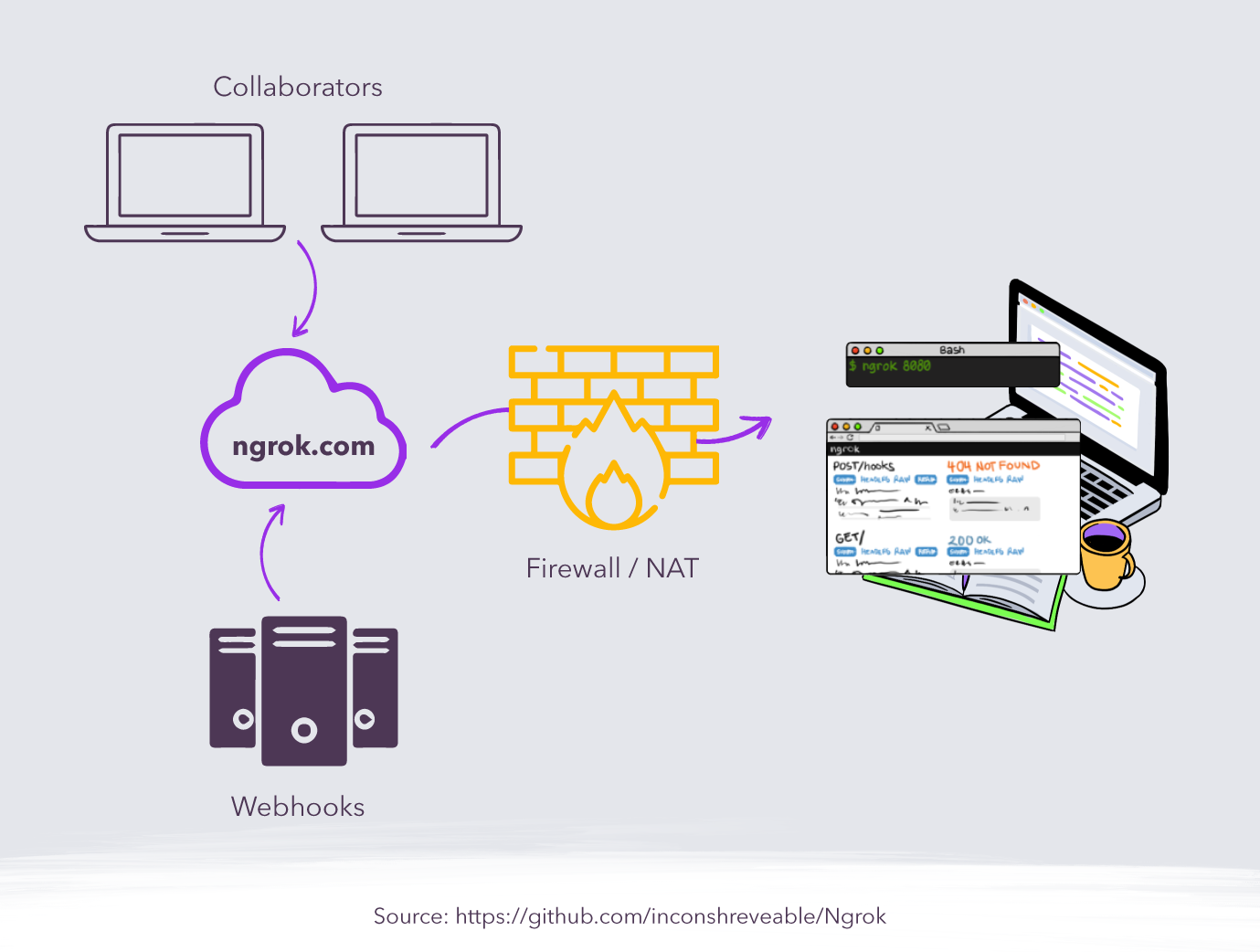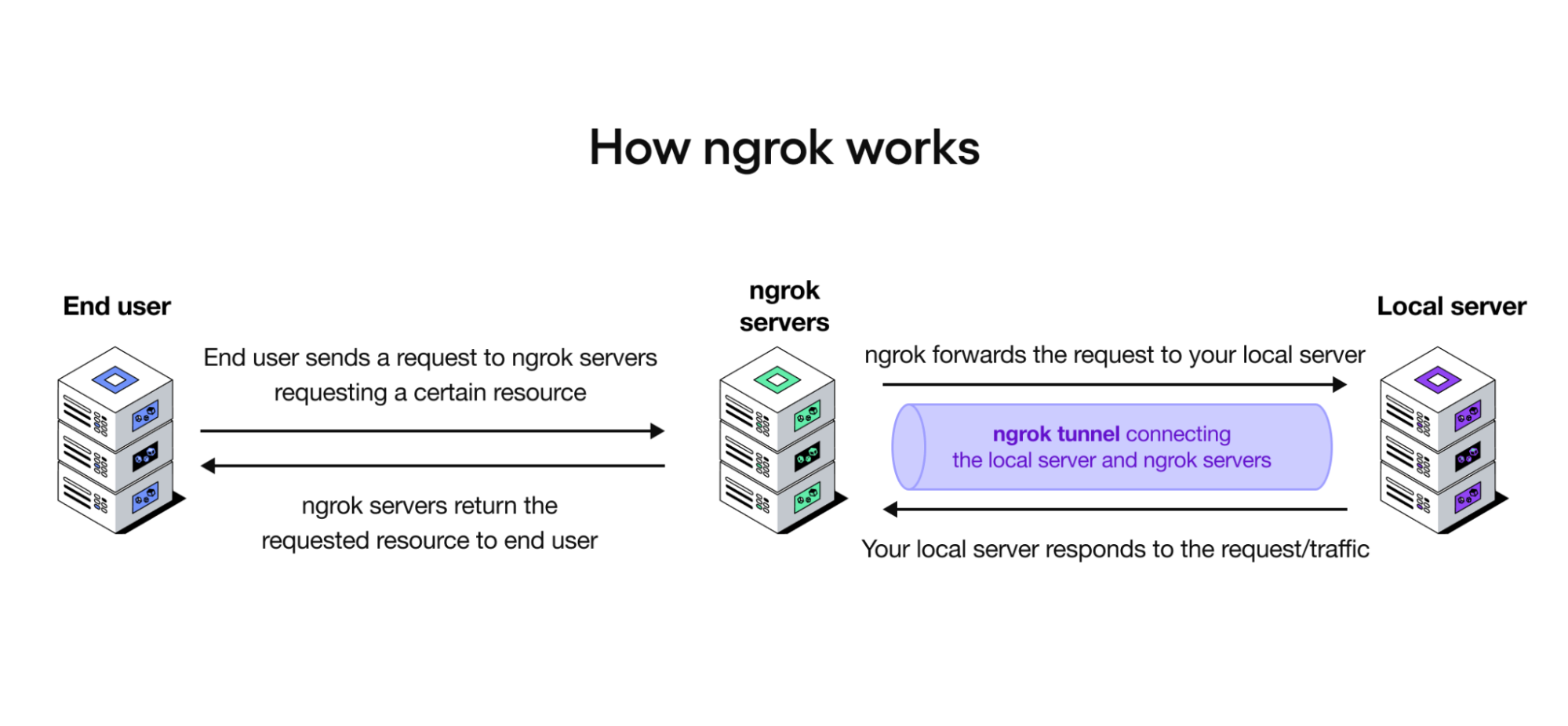Can a simple tool truly revolutionize the way developers work, transforming local environments into globally accessible platforms with unparalleled ease? Ngrok promises to do precisely that, offering a streamlined approach to web development, testing, and deployment that has captivated the attention of millions of developers worldwide.
In the ever-evolving landscape of software development, efficiency and accessibility are paramount. Developers constantly seek ways to streamline their workflows, collaborate seamlessly, and deploy applications with minimal friction. Ngrok emerges as a solution, presenting a potent utility that allows developers to effortlessly expose local web servers and services to the internet, bypassing the complexities of network configuration and firewall management. It serves as a bridge, creating a secure tunnel between a developer's local development environment and the public internet.
Ngrok's core functionality centers around its ability to create a public URL that redirects incoming requests to a developer's local development environment. This seemingly simple mechanism unlocks a world of possibilities. Testing webhooks, for instance, becomes a breeze. Developers can instantly verify the functionality of their applications' integrations with third-party services like Twilio, GitHub, or Okta, without the need for complex network configurations. This feature is particularly useful for developers working with platforms that rely on callbacks or real-time updates, enabling them to simulate interactions and debug their applications in real-time.
Beyond webhook testing, Ngrok provides a convenient way to showcase development progress to remote stakeholders, such as clients, colleagues, or supervisors. Instead of grappling with complicated network setups, developers can simply share the public URL generated by Ngrok. This link provides instant access to the local development environment, allowing stakeholders to view the application's latest iteration and provide feedback without the need for VPNs or other cumbersome configurations. This streamlined sharing process not only accelerates the feedback loop but also fosters greater collaboration and transparency throughout the development process.
Furthermore, Ngrok proves invaluable for running personal web servers without the hassle of configuring intricate network settings. Developers can quickly deploy their personal projects, portfolio websites, or test environments, making them accessible to the world with minimal effort. This is particularly beneficial for those who are learning web development or experimenting with new technologies, as it allows them to showcase their work and share their creations without being hindered by the complexities of server administration.
Ngrok's architecture is designed for security and efficiency. The platform handles authentication, encryption, and connection management, insulating developers from the complexities of network security. This built-in security infrastructure ensures that the connection between the local development environment and the public internet is both secure and reliable. The service employs robust encryption protocols to protect data in transit, ensuring that sensitive information remains confidential. Furthermore, Ngrok's management features handle the complexities of connection management, ensuring a stable and consistent connection between the local development environment and the public internet.
Ngrok's capabilities extend far beyond simple web server exposure. It serves as a globally distributed reverse proxy, designed to secure, protect, and accelerate applications and network services, irrespective of their physical location. This global reach enables developers to deploy their applications worldwide, with the assurance of performance and security. The service's reverse proxy capabilities provide a layer of abstraction between the user and the local development environment. This shields the development environment from direct exposure to the internet, enhancing security. The reverse proxy also provides load balancing and caching, which optimizes the application's performance, ensuring a fast and responsive user experience, even under heavy load.
Security is a paramount concern in today's digital landscape, and Ngrok has been built to address these concerns head-on. The platform is designed to be highly secure, providing remote access in a safe and controlled manner. While the level of security ultimately depends on how the service is configured and used, Ngrok's inherent security features provide a strong foundation for protecting applications and data. Encryption and control features are at the core of the security model. Ngrok uses robust encryption protocols to safeguard data transmitted between the local development environment and the public internet, ensuring data confidentiality. It also offers granular control features, enabling developers to restrict access to their applications and services, limit the scope of access, and implement other security measures that align with their specific needs.
Ngrok distinguishes itself as the leading solution for making any application, device, or service securely available on the global edge within seconds. This swift accessibility, coupled with its robust security features, makes it a go-to tool for developers of all levels. Ngrok streamlines the entire development cycle, from testing and debugging to deployment and collaboration, ultimately enhancing developer productivity and accelerating the time-to-market for applications.
Ngrok simplifies the development process by wrapping authentication, remote management, load balancing, and networking into a programmable component. This simplifies the task of configuring and managing these crucial aspects of web development. The service's programmability enables developers to customize the platform to align with their specific requirements. Whether it is integrating with existing authentication systems, implementing custom load balancing rules, or fine-tuning network settings, Ngrok provides the flexibility developers need.
The widespread adoption of Ngrok by over 7 million developers stands as a testament to its effectiveness and ease of use. The platform's appeal extends beyond individual developers, garnering recommendations from category leaders such as Twilio, GitHub, Okta, and Microsoft. These endorsements underscore the platform's reliability and trustworthiness, solidifying its position as a valuable tool within the software development community. Ngrok's success is further evidenced by its continuous growth and development, with new features and enhancements constantly being released to meet the evolving needs of its users.
Ngrok is, in essence, a portal. A program designed to facilitate access to private systems that are typically shielded behind NAT (Network Address Translation) or firewalls, making them accessible from the vast expanse of the internet. It operates as an encrypted TCP tunnel, providing an address accessible to anyone connected to the internet, while simultaneously connecting the tunnel's other end to local functionality. This approach eliminates the need for complex network configurations, allowing developers to focus on their code rather than the intricacies of network administration.
Environment independence is one of Ngrok's key strengths. It operates flawlessly across diverse environments, providing consistent functionality regardless of the platform. The service is designed to work seamlessly across a wide spectrum of cloud providers, including AWS, GCP, and Azure. It extends its compatibility to hosted container platforms like Heroku, Render, and Fly. This flexibility allows developers to deploy their applications in their preferred environments, without being constrained by platform-specific limitations. This environment independence simplifies the development process, enabling developers to work on projects from anywhere, using any infrastructure, with consistent and predictable behavior.
Ngrok serves as a powerful utility that empowers users to locally share or access any locally hosted web application via a publicly accessible web URL. This public URL, hosted on the ngrok.io domain, acts as the gateway for incoming traffic, which is then tunneled through to a specified localhost port. This mechanism allows developers to effortlessly share their work with others, without requiring them to navigate complex network configurations or IP addresses. The simplicity of this process greatly accelerates the collaboration process, allowing stakeholders to provide rapid feedback and suggestions.
Ngrok is more than just a tool, it is a paradigm shift in the way developers approach their work. It provides a streamlined method for accessing and testing applications and services from any location, without altering network configurations. This is a major advantage for remote developers, individuals working from different locations, or development teams spread across various locations. The ease of accessibility allows developers to work from anywhere, at any time, without facing accessibility barriers.
In the realm of development, testing, and production, understanding how Ngrok operates is crucial. It is a service that exposes upstream services to the internet through a global network of servers. This global network ensures high availability and optimal performance for users, irrespective of their geographical location. Furthermore, Ngrok provides advanced capabilities for authentication, transformation, and acceleration of traffic through a range of modules, along with the option to run a lightweight agent within the application's environment.
Ngrok is a tool that gives developers a means to expose their local web servers to the internet. It simplifies the development process. It eliminates the need for complex network settings or VPNs, and allows developers to quickly share their work with others, including remote stakeholders and colleagues.
The platform is a flexible and secure connectivity solution for applications and APIs, whether they reside in public or private networks. The service streamlines development, production, and management through features such as an API gateway, device gateway, Kubernetes operator, and global load balancer. Ngrok's features make it a versatile tool that supports various needs, from exposing APIs securely to managing IoT devices.
Essentially, Ngrok creates a secure bridge between the local development server and the internet, enabling the secure exposure of locally hosted services to the web. This feature is particularly beneficial for testing webhooks, sharing projects, and accessing internal tools remotely. It empowers developers to test and showcase their work with minimal effort.
Ngrok is an invaluable tool, and its power lies in its ability to enhance the development workflow. Whether the task is testing webhooks, showcasing projects to clients, or accessing internal tools remotely, Ngrok offers a secure and streamlined solution.
Ngrok is a versatile tool. It grants developers the ability to expose their local development environments securely to the internet. It creates a secure tunnel from a public URL, provided by Ngrok, to the local server, thus creating an accessible interface.
To ensure the installation is successful, a simple command can be executed, which verifies the functionality of the installed utility.
Ngrok is a platform that allows the organization of remote access to web servers or other services operating on a PC, using the installed utility. This remote access functionality allows developers to work on their projects, regardless of location, by providing secure and easy access to their local development environments.
Ngrok offers a wide range of functionalities, and understanding its capabilities is key to maximizing its potential. By simplifying the process of exposing local web servers to the internet, Ngrok empowers developers to work more efficiently, collaborate more effectively, and accelerate their development workflows.


